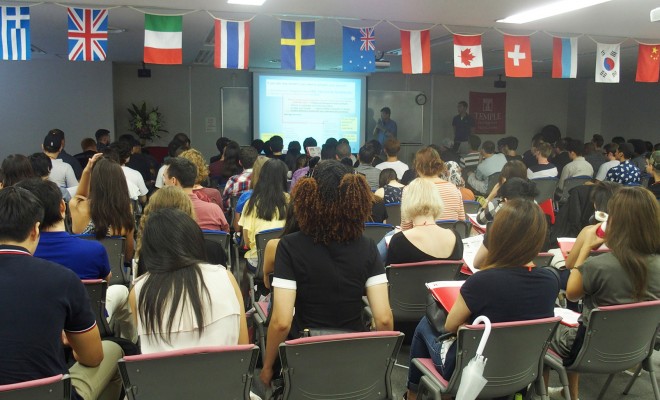Enrollment in the undergraduate program at Temple University, Japan Campus (TUJ) hit an all-time record high with 940 in fall 2015. Several factors contribute to this trend: resurgence of the Japan brand in recent years, and other economic factors, especially the weakened yen. However, it also indicates that TUJ’s more than 30 years of commitment to quality higher education as the only four-year American university in Japan has gained wider recognition.

After being designated as a “Foreign University, Japan Campus” by Japan’s Ministry of Education, Culture, Sports, Science and Technology (MEXT) in 2005, the number of undergraduate students—especially those who needed a student visa—increased, to nearly 900 in fall 2009. However, the combined effects of the 3/11 disaster and the historically strong yen caused enrollment to drop to less than 700 in fall 2012. The bounce back started in fall 2013. The numbers reached 809 in fall 2014 and 812 in spring 2015. The number of new students from outside (excluding those students from TUJ’s Academic English Program) has been setting record-highs for four consecutive semesters. Dean Bruce Stronach reported this trend in an Update from the Dean dated September 29, 2015 that “(n)ot only were summer 2015 numbers very strong; we have over 900 students this fall, which far exceeds our highest number of undergraduate students ever.”
Chie Kato, Senior Associate Dean for TUJ and Associate Dean, Enrollment Management, analyzes this continuing upward trend in enrollment:
The weakening yen has definitely been a favorable economic factor for overseas students, but TUJ’s recruiting activities around the world and thorough student services counts for more. We have seen extremely strong new student enrollment in the past four semesters. The number of new undergraduate students exceeded 200 in fall 2015, which is the record high in TUJ’s history. Student recruiting strategies and marketing have brought these positive results, but in addition, yield has been improved due to the enhanced follow-ups with accepted students by Admissions Counseling and the Office of Students Services, and collaboration among the administrative departments.”
Kato added, “Another factor is ‘Midterm Progress Ratings’ by faculty and the Academic Advising Center that Temple University has adopted university-wide. This allows students to see their academic standing in the middle of the semester, which could lead to decreasing dropout rates due to poor academic performance and improving retention rates. Strengthened internship programs and the high employment rates of TUJ graduates have contributed to this steady increase in enrollment as well.”

